About the Young Idea
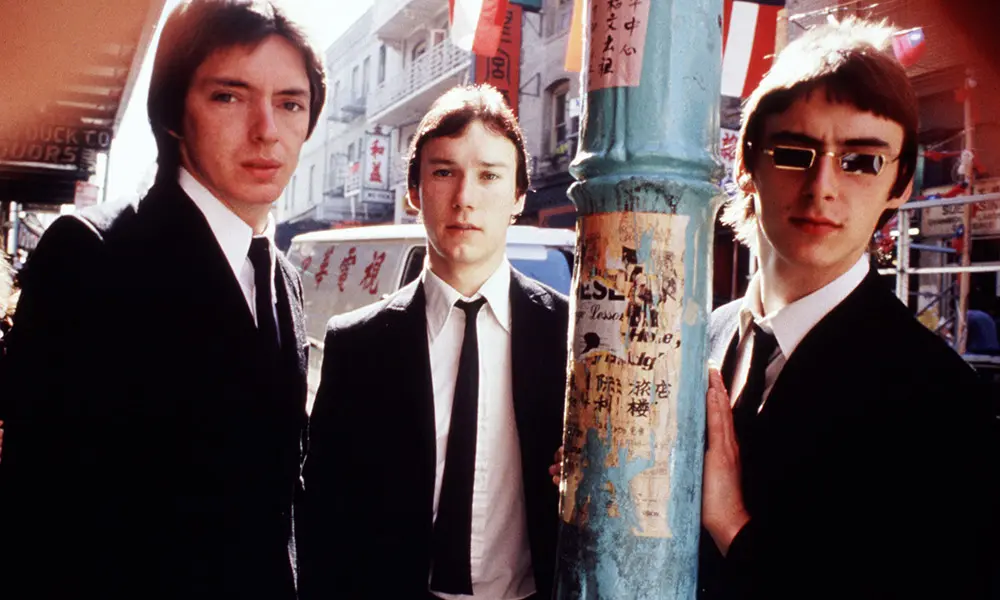
Just how important were The Jam?
Youth Explosion!
The Jam first entered the public conciseness in 1977 at the time of Punk, but to call The Jam a punk band is a disservice to them. Unlike there contemparies, the Sex Pistols and The Clash, The Jam were not afraid to look back to the decade before, all three members were big fans of music from the 60s, particularly Motown, The Who and The Beatles. Although the songs were raw, and visceral like those of the Sex Pistols and The Clash it was clear to many of those around them that Paul Weller was quite the songwriter.
'In the City' was the bands first single, and it reached the Tip 40 which would start a trend for the band. It's a relatively simple punk song and the band were influenced by the scene around them at that time but also by bands like The Who. The bands debut album would also take the name of this song and it began to put the band on the map. It seemed to some up the feelings of young people at the time, mainly because it was written from the perspective of a young person who was living through it. 'In the City' contained Jam favourites like 'Away from the Numbers' and 'Art School.' This record was the first step in setting The Jam apart away from the punk scene.
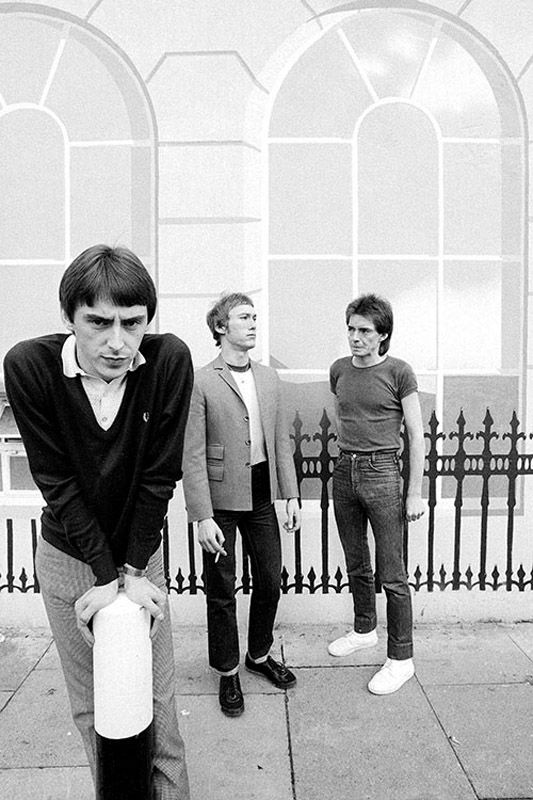
'All Around the World' followed, and this nearly broke into the Top 10, due to the quick success and loyal following the band had built up. Polydor, the bands record label pushed them to release a new record. 'This is the Modern World' came out towards the end of 1977 and many saw the record as a disappointment compared to the bands debut, it seemed to lack the cutting edge of the previous record. This album also saw Bruce Foxton take over songwriting duties for some songs, and it was quickly decided that Paul Weller would become the bands chief song writer.
News of the World
After the disappointment of 'This is the Modern World' the next batch of songs really were make or break fo the band. Not ideal, when your main songwriter has writers block. In March 1978 The Jam would release a non album single written and sung by Foxton, 'News of the World' which would chart a Number 27, the bands second biggest hit to date. The next batch of songs presented to producers, mainly by Foxton were considered as poor, The Jam were in trouble.
Punk had been and gone, the UK music scene was dominated by New Wave bands like Talking Heads, and Blondie. It would require The Jam to come up with something completely different. Looking for inspiration Paul Weller returned home, to Woking to come up with new songs. Come up with new songs he did.
'Please Don't Forget Me, Or Any of my Kind'
The first of these new songs was a double a side, a cover of The Kinks, in 'David Watts' and a Weller composition with 'A Bomb in Wardour Street' a scathing attack on the thugs that had become associated with the punk scene. The second single is arguably the best song Paul Weller ever wrote for The Jam 'Down in the Tube Station at Midnight.' a story in a song, about a unnamed man, who enters a tube station at midnight trying to get home. The man is attacked by a group of we assume right wing thugs 'smell like pubs, and Wormwood Scrubs, and too many right-wing meetings.' Lyrically the song provides a snapshot into 1970s London, the urban decay, the unemployment, the racism, the violence. Weller juxtaposes these parts of reality with family life, and suburban homes. It's genius and it makes it even more amazing that Paul Weller was 19/20 when he wrote it.
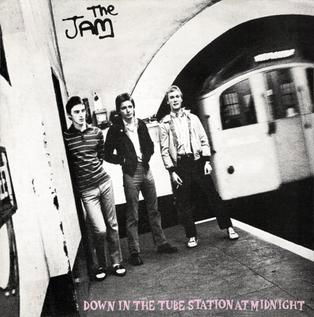
Despite having a BBC airplay ban due to its "disturbing nature," it became The Jam's second UK Top 20 hit. The then Radio 1 DJ Tony Blackburn complained that, 'It's disgusting the way punks sing about violence. Why can't they sing about trees and flowers?"'
The BBC were firmly on the wrong side of history for that one, the song does the opposite of encourage violence. Paul Weller was simply painting a picture of what was really happening in Britain at the time. 1970s London was not the London, Weller once loved as a child. It was much darker on sinister.
Following the two singles, The Jam would release a third album 'All Mod Cons' for many the bands finest work. The album had the two singles along with 'To Be Someone (Didn't We Have a Nice Time?)' 'Billy Hunt' and even a love song in the form of 'English Rose' gone were the Woking punks, Paul Weller, Bruce Foxton and Rick Buckler were becoming one of Britain's most important bands.
We're No Longer as Thick as Thieves
After the release of 'All Mod Cons' the band would release two of their best singles 'Strange Town' and 'When You're Young.' Weller was maturing into quite the songwriter. Even the B-Sides to these two singles have gone on to become Jam classics 'Smither's Jones' and 'The Butterfly Collector' are up there with any single the band ever released. The themes in Jam songs were becoming more prominent, the band were not afraid to talk about what they were seeing, and hearing about. Whether that was unemployment, the disenfranchisement of the youth or even the class divide.
The first single for The Jam's fourth album 'Setting Suns' was the most political song The Jam had written to date, 'The Eton Riffles.' The song was inspired by skirmishes and fights between protesters on a Right to Work march, a campaign that was being run by a left-wing political party and students from Eton, one of the UK's most exclusive public schools. A school attended by politicians and royalty. It was an attack on the class system in Britain, and those in power in a brilliant yet scathing way.
The album itself originally had a concept when it was conceived. Detailing the lives of three boyhood friends who later reunite as adults after an unspecified war, only to discover they have grown both up and apart. The concept was never finished but there is definitely reference to it on the album with songs like 'Little Boy Soldiers' and 'Thick as Thieves' yet the album also has reference to Bruce Foxton's father loosing his job with 'Smither's Jones' originally a B-Aide. Although the album was more rushed than it's predecessor and contains a pretty poor cover of a Motown song 'Heatwave' it contains some of the band's best work. and also my favourite Jam song 'Thick as Thieves.
Anti Establishment Hit's Number One
1980 saw the band enter a new decade, and also it was hugely successful year for the band. The band's first single of the decade was meant to be 'The Dreams of Children' a song about the loss of childhood optimism, complete with the B-Side 'Going Underground' however due to an error when labeling the A and B-Side were reversed so 'Going Underground' became the A-Side and received all of the attention and airplay. It was listed as a double a-side and reached Number 1 in the UK. Giving the band there first Number 1 hit. It spent 3 weeks at the Top.
Lyrically the song was an attack on Margaret Thatcher's newly elected Tory Government and the public's obsession with the needs of the military and industry. Which in turn saw them neglect the needs of each other.
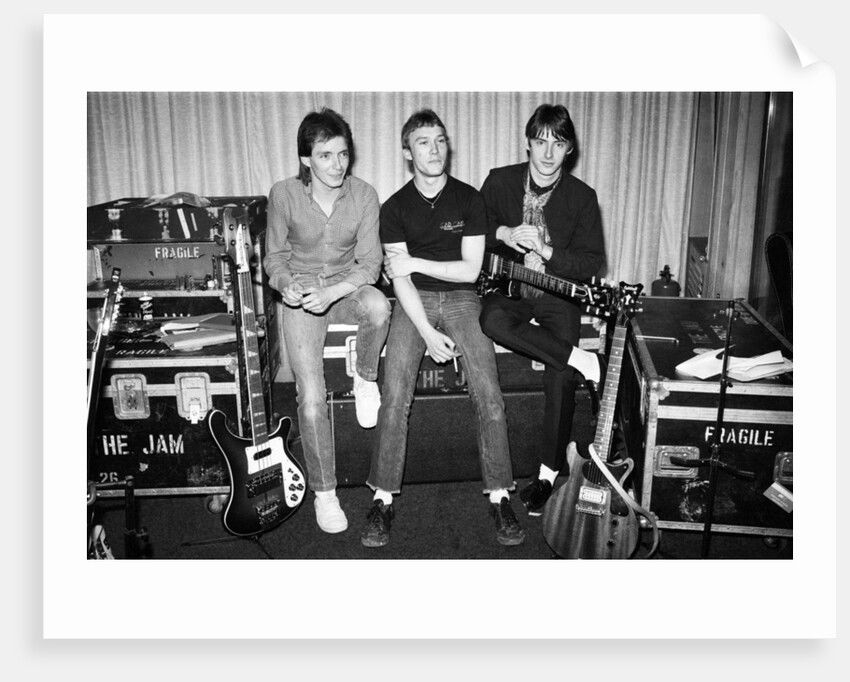
The Jam had become one of the biggest bands in Britain, they were writing anthem after anthem. Yet each song had a meaning and a message, they were helping open the public's eyes to what was going on. In a way everyone can understand. Young People were dancing, chanting and jumping up and down to some of the most political songs of all time.
A Pneumatic Drill and Ripped Up Concrete
The Jam's album of 1980 was 'Sound Affects' an album influenced by The Beatles and Michael Jackson according to Paul Weller. The Beatles definitely feature, I'm not sure about Michael Jackson though. 'Start' the albums first single is a blatant rip off of Revolver's 'Taxman' that did not stop it from hitting the Top spot i the UK though. Weller dipped into psychedelia with songs like 'Monday' and 'Dream Time' and the social commenatry hadn't gone away.
'Sound Affects' contains two of Weller's pieces of social commentary with 'That's Entertainment' and 'Man in the Corner Shop.' According to Weller he wrote "That's Entertainment", a bitter slice-of-life commentary on the drudgery of modern working-class life, in around 15 minutes upon returning inebriated from the pub. A simple acoustic melody with some of the best lyrics about working class life, drawing on what he could see and hear to create a visual masterpiece. 'Man in the Corner Shop' comments on the desires of people and always wanting more than they have. Paul Weller describes it best 'It keeps coming back to the man in the corner shop: the person underneath who's jealous because he thinks he's making all the money, but the man in the corner shop's struggling and the boss in the factory also gets his cigarettes from the corner shop.'
Stop Dreaming of the Quiet Life
The Jam would continue releasing singles into 1981 with 'Funeral Pyre and Absolute Beginners' the later of which would reach Number 4 in the UK Charts 'Funeral Pyre' is one of the only songs that would see all of the bands members get a song writing credit, the other being 'Music for the Last Couple' which was on 'Sound Affects.'
1982 would see the band release a final studio album 'The Gift' which would hit the top spot in the UK and also make the US Billboard Hot 100, this album saw the band take a more R&B and funk approach. The album single 'Town Called Malice' has a very similar bassline to 'You Can't Hurry Love' by The Supreme's. The song itself has gone to become the bands most famous song, and there third Number One Single. Again another piece of social commentary of working class life in Thatcher's Britain.
'The Gift' would also contain 'Precious' as a double a-side to 'Town Called Malice' and second single 'Just Who is the 5 o Clock Hero' a song about the 9 to 5 workers and the nature of reality for many of The Jams fans. The people who Weller had ridiculed on 'Mr Clean' he now portrayed them as the 'real heroes of Britain. The album tracks on this album are special though, it gave us 'Running on the Spot' 'Ghosts' and 'Carnation' three of the best things the band ever released.
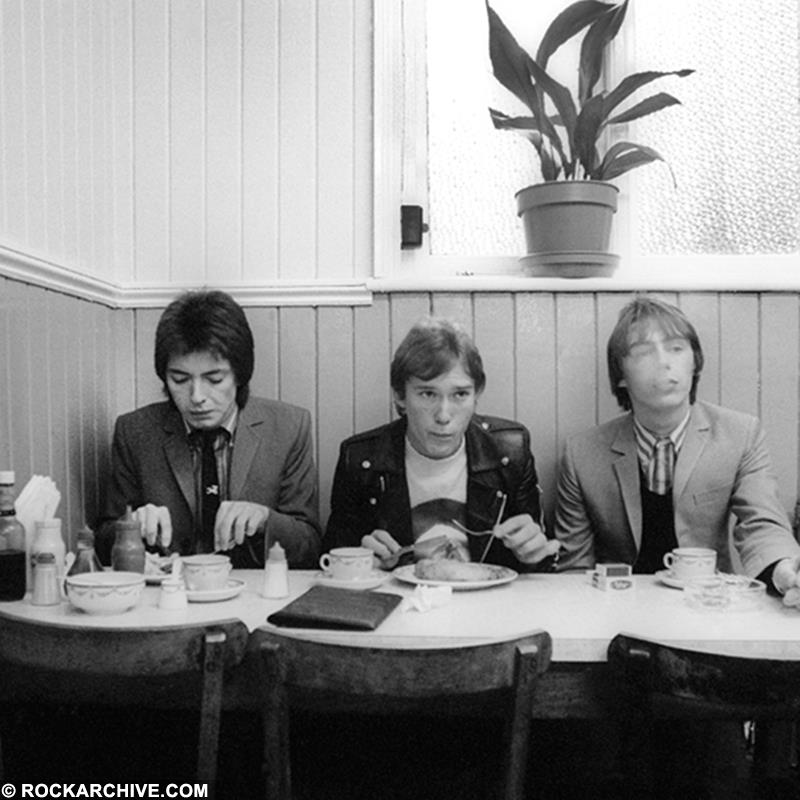
1982 was The Jam at the very top, when 'Town Called Malice' reached number one the group had the honour of performing both it and its double A-side, 'Precious' on Top of the Pops – the only other band to be accorded this honour being the Beatles. Two more singles followed 'The Bitterest Pill (I Ever Had to Swallow) which reached Number 2 and then 'Beat Surrender' which hit the top spot. The Jam were arguably the biggest band in the world, everything they released seemed to hit the Top 10. They could do no wrong.
The Bitterest Pill (I Ever Had to Swallow)
Then on the 30th October 1982, Paul Weller said this to fans 'At the end of this year, The Jam will be officially splitting up, as I feel we have achieved all we can together as a group. I mean this both musically and commercially. I want all we have achieved to count for something and most of all I’d hate us to end up old and embarrassing like so many other groups do'
A final tour was announced where the band would play five consecutive nights at the Wembley Arena, all of which sold out within twenty minutes of tickets becoming available. The last date on the original itinerary had been scheduled for 9 December 1982 at Guildford Civic Hall, close to the band's hometown of Woking. However, due to ticket demand, an additional date was added at the Brighton Conference Centre on 11 December 1982 for their last performance.
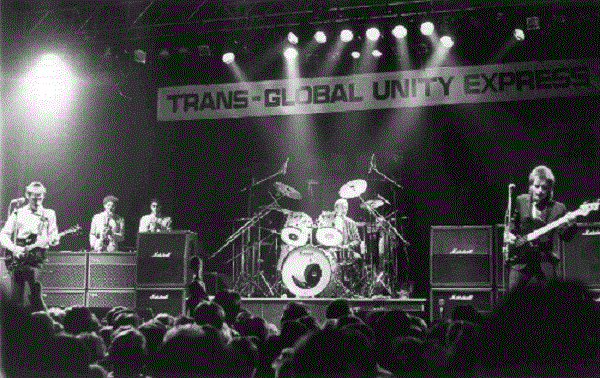
Legacy
The impact of The Jam cannot be understated, they were a band for five years and they had 18 consecutive Top 40 singles in the United Kingdom, from their debut in 1977 to their break-up in December 1982. That output rivals any other British band ever, yes even The Beatles! The music will always live on to, those songs are still relevant today and they still relate to young people because they were written and performed by a young songwriter and a young band.
They have gone to be an influence on virtually all British guitar music since. The tales of working class life can be heard in Blur's Britpop work, especially 'Modern Life is Rubbish.' Pulp would be influenced by Weller's fascination with the class system for 'Common People'
Noel Gallagher and Oasis were definitely influenced by them, he has mentioned The Jam countless times in interviews and the raw visceral sound of The Jam is all over the early Oasis records.
Into the 2000's The Libertines and Arctic Monkeys were influenced and would write there own modern tales of Britain based on what they heard The Jam do all of those years before.
It is a sound that can be traced through every great British guitar record since. I promise it's in there somewhere.
My final thoughts, Paul Weller was right with what he said in 1982, they had done all they could achieve, and they broke up at the top. Name another band who broke up at their peak. I can name two ABBA and The Smiths. It is a rarity. Now you might think I want a reunion, I don't. The Jam reuniting now would go against everything that made them great, they are songs from young people for young people. Youth Anthems and highly charged political pop songs. It would not be right.
So how important were The Jam? In terms of British bands, they are up there with The Beatles, and The Smiths for me!
Thank you for reading x